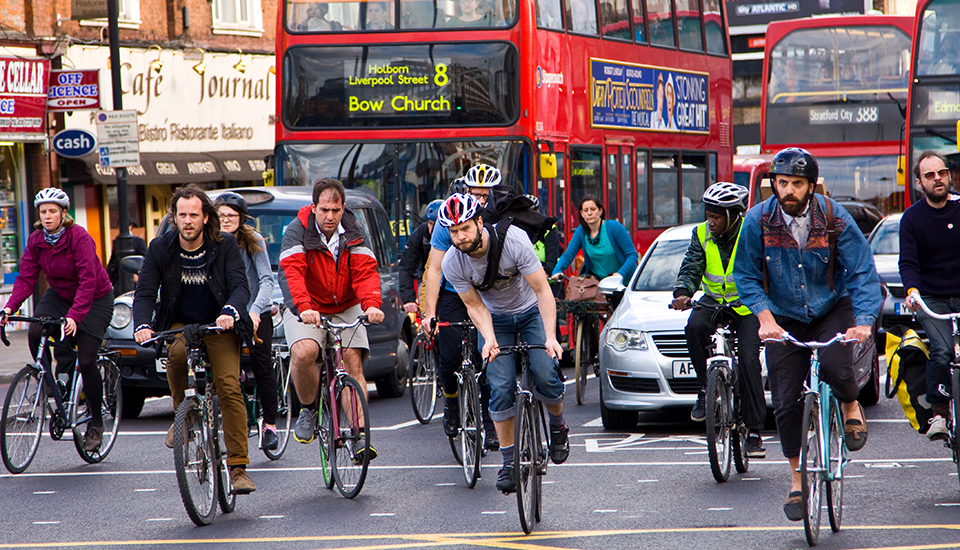Paying road tax is a necessary part of owning a motor vehicle, like having car insurance, or making sure your MOT is up to date. Whether you know it as car tax, or by its official name, Vehicle Excise Duty, it's something most drivers must consider.
The money raised through road tax is paid directly into central government funds and is used for projects to benefit everyone, such as road improvement works and maintenance. While most vehicle owners have to pay road tax, not all road users are compelled to do so by law.

© Michaelpuche / Shutterstock.com
Following recent changes to the Highway Code, giving cyclists more rights, there has been plenty of debate about whether cyclists should have to pay road tax. Currently, they don't have to pay anything to use the UK's road network.
Why don't cyclists pay road tax?
Everyone has heard the argument that cyclists using Britain's roads should be paying road tax like motor vehicle owners. Some motorists dislike cyclists, especially when they're riding two abreast in the road and preventing cars from overtaking.
Since the new rules came into effect, some motorists' dislike of cyclists has intensified. The law permits cyclists to ride two abreast, but it also asks them to "be aware of drivers" behind and let them overtake when safe.
Traditionally, cyclists often ride close to the kerb to allow cars to pass. However, the new rules suggest cyclists should ride in the centre of the lane on quiet roads, in slow-moving traffic and when approaching junctions.
Online polls reveal 35% of motorists don't comply with the rules when it comes to leaving a safe distance to overtake cyclists. Drivers said they were inconvenienced by cyclists ahead of them. This has led to cyclists' groups claiming car drivers try to bully other road users out of the way.
They argue cyclists shouldn't have to pay Vehicle Excise Duty because they don't produce harmful emissions into the atmosphere. Today's ultra-low emission vehicles aren't subject to paying road tax and cycles give off no emissions at all. Cyclists class road tax as a "pollution tax" and believe it's unlikely they will ever have to pay.
The number of cyclists on the UK's roads at weekends has increased by around 200% since March 2020. An estimated 7.5 million people cycle for leisure, sport or travel in England alone. They complain the government isn't spending enough on improvements such as more cycle lanes - 82% say they don't like cycling in traffic.
Which motorists don't pay road tax?
Owners of brand new cars that produce zero CO2 emissions and are valued at less than £40,000 don't need to pay road tax. Nor do owners of cars registered between 1st March 2001 and 31st March 2017 that produce up to 100 grams of CO2 per kilometre.
Some motorists with a disability might be entitled to free car tax if they fulfil certain criteria. They need to have an invalid carriage, such as a mobility scooter; receive the Enhanced Mobility Component of Personal Independence Payment; or receive War Pensioners' Mobility Supplement.
Most vehicles used by organisations to provide transport for disabled people are exempt from road tax. In addition, you don't need to pay car tax on so-called "historic" vehicles that are 40 years old or more.
Electric vehicles are exempt if the electricity comes from an external source, or from an electric storage battery that isn't connected to any source of power when the vehicle's moving.
Vehicles used for agriculture, forestry and horticulture are also exempt, such as tractors and light off-road agricultural vehicles. Agricultural vehicles classed as "limited use" that make only short journeys between sites of up to 1.5 km on public roads are also exempt. However, the different sites must be owned by the same person.
The government makes around £6.5 billion of revenue per year through Vehicle Excise Duty, administered by the DVLA. The rate varies depending on the CO2 levels of each car. The tax band is determined when the car is first registered.
Critics of the road tax system believe it's unfair because the same charge is levied at all vehicle owners, regardless of whether they're in a low-income group and find it difficult to pay.
I think the important thing to consider above all else is road safety. Owners of older cars could certainly benefit from upgrades such as reverse cameras, immobilisers, parking sensors, sat navs and other enhancements to keep them safe on Britain’s roads.

